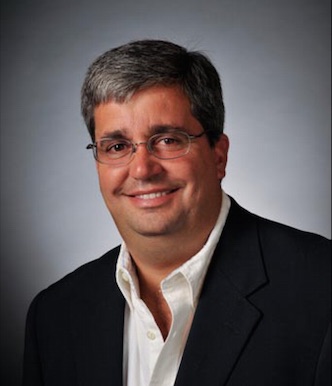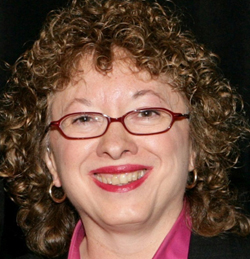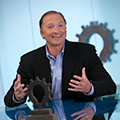When Stroudsburg native Kevin Detrick graduated from high school in 1981, he talked his parents into leasing him the defunct car wash attached to a building they’d bought. At 17, a car wash seemed like a “neat, fun thing to do,” he recalls.
During his college years at Lehigh University, where he majored in business management, he bought two more car washes. By the time he graduated in 1986, he was well on his way to what would become his life’s work.
Detrick quickly found out that there’s more to running a car wash than meets the eye: The machinery is complex, needing constant adjustment and maintenance, and making sure customers are happy with the results requires vigilant quality control.
Founded in 1988, Innovative Control Systems manufactures high-tech controllers for car washes, as well as outdoor kiosks to allow for complete automation — customers enter their choices and pay with a card. Their trademark Tunnel Master WBC and their latest product 4D are taking car washes to the next level all over the United States, and in Australia and Europe.
Meanwhile, that first car wash? It’s still running. Sparkle Car Wash in Stroudsburg is where ICS does all its R&D and testing of new systems.
It’s “probably one of the most state-of-the-art car washes in the country,” insists Detrick.
What inspired you to found Innovative Control Systems?
When I graduated from Lehigh University, I didn’t have the money to buy brand-new hardware in the car wash marketplace. I had to buy a car wash controller, and then I had to buy a point-of-sale management system, and then I had to pay to interface them together.
So instead, we took a RadioShack computer and made that run the car wash. We combined the POS [Point of Sale] management system and car wash controller in one unit. Knowing that when a car was going through a car wash there were a lot of ways attendants could steal, we tied the money not just to register activity, but also to tunnel activity, so there could be no cheating. It grew from there.
We started doing this in 1988, predominantly for [my business], but other car wash operators saw it and wanted it. We had to go back to the drawing board to make it more market-ready. I started selling the units more seriously in 1992, and then in 1994 we entered the national marketplace.
We started on top of the car wash in Allentown with an office about the size of a hotel room.
In the beginning, we met a lot of market resistance. People said we had a better product, but our competitors were better financed, would steal our idea, and we wouldn’t be around in two years to support the products we sold.
When it started taking off, we were growing very rapidly — about 70 or 80 percent a year.
What resources did you take advantage of in starting your company?
Ben Franklin Technology Partners of Northeastern PA helped us in the beginning, with investment money and with helping us make our product more sophisticated to compete in the national marketplace. We also did “tiger sessions” where they would analyze our business plan and offer suggestions. They helped with their vast number of contacts to find us help in specific areas.
Later, when we built our present headquarters in Wind Gap, the Lehigh Valley Industrial Development Authority issued a bond for us to finance it. The Lehigh Valley Economic Development Corporation provided low-interest loans fixed for 15 years when we bought and renovated a building in Palmer Township (Easton).
Tell a bit more about your products.
Our core product was the equipment controller, which measured the speed of the chain and the size of the car, and turned the equipment on and off for that vehicle. Today, one of the things we’re doing to move the car wash to the next level is scanning the image of the car and targeting the chemistry, the pressure and the washers around the shape of that vehicle. That’s our newest car wash control technology: Tunnel Master WBC.
We have attended POS, but we have created a whole new business model we call the Express Car Wash, and a flexible service offering. Labor is the most expensive way to wash a car, and it also causes bottlenecks. Next to repeatable quality, speed is the second most important thing to customers.
So we have automated a lot of the business process: greeting the customer, taking the order, cashiering and driving in and out of the car wash. By putting our outdoor kiosk in front of the customer, we deliver the same message to every customer. Customers pick what they want, pay for it, and then we open the gate and we stack the cars in order, so we know what each customer gets inside the car wash.
This system is what funded the growth of ICS. We’re a leader in the marketplace because of this.
It’s also very green, because we target the chemistry for the car. An SUV needs more chemicals than a sedan. Currently, most car washes use the same volume of chemicals and water for all vehicles. We don’t do that anymore and this reduces operating costs.
The average car wash at that time was washing about 4,000 cars a month. Most of our sites now wash 10,000 to 30,000 a month. All you need is a tunnel attendant to help load the cars — making sure they’re on the conveyer properly — and a manager to fine-tune the equipment, service the kiosks and deal with customers.
What has been the biggest challenge so far?
In 1999, we were purchased by a NASDAQ company and they kind of ruined us. They got charged with accounting fraud from before we dealt with them, and they didn’t provide us with the working capital they promised when we merged with them.
I only agreed to the merger because we were going to receive more working capital to help the company grow faster. I was outstripping my ability to fund the growth of the company. Service was always six months behind, because I’d have to sell a unit, get paid for it, and then hire more people to service it. I really needed the staff in order to sell more units. We were also looking for capital to fuel product development, move into more markets and have more features.
We were doing about $1.2 million a month when we went into the agreement, and when we pulled out of it 11 months later, we were at $67,000 a month. By then the market felt ICS wasn’t going to be around, so they didn’t want to purchase our products.
How did you recover from that?
We had to start over. We put all our focus on customer service and ended up having to institute a 50 percent deposit on each order. This helped fund our inventory and the growth of the company.
The other thing we did was ask to get paid when we shipped the unit, rather than waiting until the customer installed it, which usually happened a couple of months later. We used to wait until we helped with the set-up and training.
It took until about 2005 or 2006 to get back to where we had been before the merger.
How has the company grown?
In 2007, when the economy slowed down again, instead of pulling back, we started to expand into the convenience store/corporate oil market, and the self-serve car washes. We also started looking at a multi-site product to tie multiple locations together in real time.
We moved into a 25,000-square-foot building in Wind Gap, where we had our offices and manufacturing operation. Later, we also bought a 20,000-square-foot building in Palmer Township, renovated it, and placed our manufacturing in that facility. The Wind Gap space is all offices now with some warehousing.
We also expanded geographically, moving into Australia and Europe to sell our products. Over the last couple of years, to support Australia and the West Coast better, we opened an office in Irvine, Calif., for sales and support.
Now we have about 125 employees.
What’s next for ICS?
We’re introducing our 4D (four-dimensional) car wash controller; it’s operating in two car washes right now. We believe this is going to be the future of car washing. We’re starting to automate more of the car wash process, in addition to the business processes around the car wash.
For customers who own five or six car washes, we’re making the equipment smarter. If something goes wrong, it sends you an e-mail saying what the problem is and how to fix it, so the maintenance person can have the right tools when he goes out to work on it.
Writer: Susan L. Pena

↑ Top


